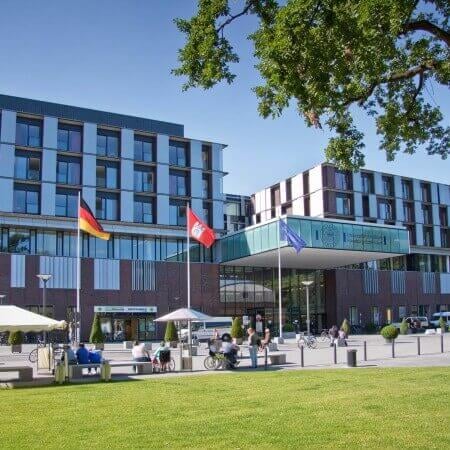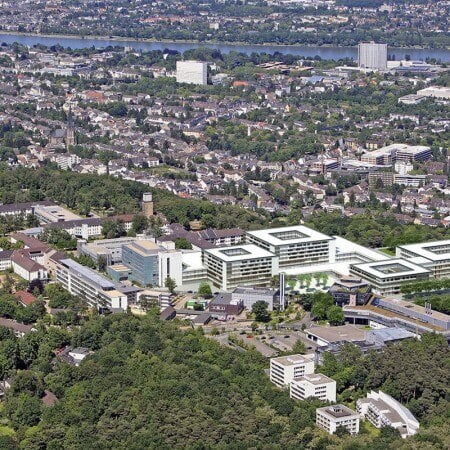Relapsing polychondritis is an immune-mediated inflammatory disease of cartilage and proteoglycan-rich tissues. The cartilages of the ears and nose are most commonly affected, but any internal organ can be involved as well. Patients may develop severe complications due to disorders of the heart, kidneys, respiratory system, eyes, joints, or cranial nerves. You can undergo your diagnostics and treatment of relapsing polychondritis in Germany to get the best results. German hospitals use innovative drugs and minimally invasive procedures to eliminate the complications of polychondritis.
Content
- Why is polychondritis dangerous?
- Conservative therapy
- Surgery and interventional procedures
As a rule, relapsing polychondritis is treated conservatively. Physicians in Germany use new biological drugs, which work even in cases where improvement cannot be achieved with standard anti-inflammatory drugs. Should any complications in the respiratory and cardiovascular systems develop, additional types of treatment may be required.
You can undergo your treatment in one of the following hospitals: University Hospital of Ludwig Maximilian University of Munich, University Hospital Rechts der Isar Munich, or University Hospital Ulm.
If you make your treatment appointment through the Booking Health service, our employees will take care of the organization of your trip. The company's doctors will advise you on possible treatment methods, and managers will take care of the non-medical part: they will select a convenient date for your appointment at a hospital, help you to get a visa and prepare your documents, book airline tickets and transfers, take care of your accommodation, and provide interpreting services.
Why is polychondritis dangerous?
Polychondritis is dangerous because, without timely medical attention, it can affect vital organs and cause severe complications.
The main manifestations of polychondritis include:
- Ear cartilage inflammation occurs in 90% of patients. This leads to ear deformities, and half of the patients develop hearing loss.
- Arthritis is the second most common syndrome. Joints become inflamed in two-thirds of patients. A third of patients have joint inflammation at the time of their first visit to a doctor.
- Laryngeal, tracheal and bronchial lesions are detected in 10% of cases at the time of diagnosis, and during life they develop in 50% of patients with relapsing polychondritis. Difficulty breathing at all levels is possible.
- Costal cartilage injuries cause chest pain. These occur in 35% of patients.
- Neurological manifestations involve the affection of the cranial nerves in 3% of patients.
- Renal manifestations may occur as well. As a result of kidney inflammation, about 10% of patients with polychondritis develop kidney failure. This is the most severe form of the disease, with a ten-year survival rate of about 10%.
- Skin manifestations occur in 20% of patients. They are manifested by skin rashes and mouth ulcers.
- Cardiovascular manifestations develop in 25% of patients. These include valvular heart disease, aortic aneurysm and dissection, myocarditis, pericarditis, atrioventricular block, and systemic vasculitis.
Conservative therapy
The goal of conservative therapy is to quickly eliminate symptoms and stop the inflammatory process. It is important for doctors to timely eliminate the effect of inflammation on the cartilaginous structures of organs and tissues.
The following drugs can be used for the treatment:
- nonsteroidal anti-inflammatory drugs;
- glucocorticoids;
- other anti-inflammatory drugs.
Immunosuppressive drugs can be used as second-line medications. They are prescribed for complications that threaten a person's life, and in the case of the ineffectiveness of corticosteroids.
Doctors in Germany also use new drugs for biological therapy. German rheumatologists treat the disease with the following drugs:
- tumor necrosis factor inhibitors;
- CD20 antigen monoclonal antibodies on B lymphocytes;
- interleukin-1 receptor antagonists;
- monoclonal anti-interleukin-6 receptor antibody;
- CD80 and CD86 inhibitors, which prevent the activation of immune T cells.
These are the latest drugs, most of which are not yet used in countries with poor medicine. They induce remission, relieve symptoms, and reduce the risk of developing complications in the vital organs.
If all these methods do not work, doctors use other drugs such as antibiotics, immunoglobulins, and anti-CD4 monoclonal antibodies. Plasmapheresis can be added to drug therapy.
Surgery and interventional procedures
Many patients suffer from complications caused by damage to their vital organs. The most common life-threatening complications include:
- bronchial stenosis, which is an impairment of bronchial patency that causes difficulty breathing;
- aortic aneurysms are local expansions of the aorta, which threaten with dissection and rupture;
- aortic or mitral valve insufficiency develops in 10% of patients;
- atrioventricular block is an impaired conduction of impulses through the heart, from the atria to the ventricles.
Bronchial stenosis may require stent implantation. During this procedure, doctors insert a tube inside, which keeps the lumen of the large bronchus open.
Aortic aneurysms are treated surgically. Doctors perform aortic prosthetic repair: they remove the expanded section of the blood vessel and implant a vascular prosthesis instead. Healthcare professionals in Germany also treat aortic aneurysms using a minimally invasive endovascular method. A prosthesis is delivered to the narrowed area of the aorta from inside the blood vessels through an incision in the leg.
For patients with heart valve disease, doctors perform operations to repair or replace them. They also carry out minimally invasive procedures in Germany through blood vessels.
Atrioventricular block in panchondritis is often reversible. However, in some cases, changes in the heart remain forever. In such situations, it is necessary to implant an artificial pacemaker to maintain a normal heart rate. Doctors in Germany implant it under the skin in the chest, and the electrodes are delivered to the heart through the blood vessels.
If you have polychondritis, you can go to Germany for diagnostic tests, treatment and rehabilitation. On the Booking Health website, you can select the best clinics in Germany, compare the cost of treatment and make your appointment at the best price. Our company's specialists will help you to organize your trip to one of the German centers.




















